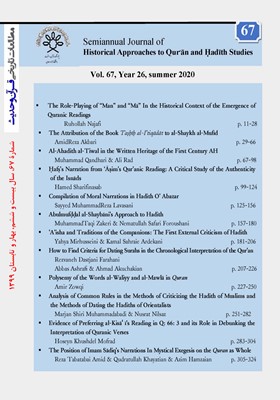Analysis of Common Rules in the Methods of Criticizing the Hadith of Muslims and the Methods of Dating the Hadiths of Orientalists
Subject Areas :marjan shiri 1 , nosrat nilsaz 2 *
1 - PhD student in Quran and Hadith Studies, Tarbiat Modares University, Tehran, Iran.
2 - Associate Professor in Quran and Hadith Studies, Tarbiat Modares University, Tehran, Iran.
Keywords: Text, Orientalists, Methods of criticizing hadiths, historiography of hadiths, Muslim scholars, Isnad,
Abstract :
Hadith is considered by Muslims as one of the most important sources of religious teachings and rules of Sharia, and the validity of the Hadith means that it is correctly attributed to its main speaker, Muslims have examined the authenticity of the Hadiths, not determined the date of their origin. However, correcting or falsifying a Hadith is implicitly related to the issue of time. Counting correctly means accepting the issuance at the time of main speaker, but there are two possibilities in ruling that the narration is fake: being made by a person at the time of the main speaker; Forgery at a later time. Western scholars consider Hadith as a historical source and the important issue for them is to determine the temporal and spatial origin of Hadiths, they have invented methods for this purpose that have evolved over time.This study with the view that what evidence of attention to the issue of time and geographical origin of the narrations in the methods of critique of Muslim Hadith can be found by analyzing a part of the Hadith heritage has concluded that some rules and points considered by scholars and Muslim narrators share the rules and points that orientalists have used in various ways of dating. Among these cases. examining the writings and different methods of a Hadith, paying attention to the common narrator.
_||_

